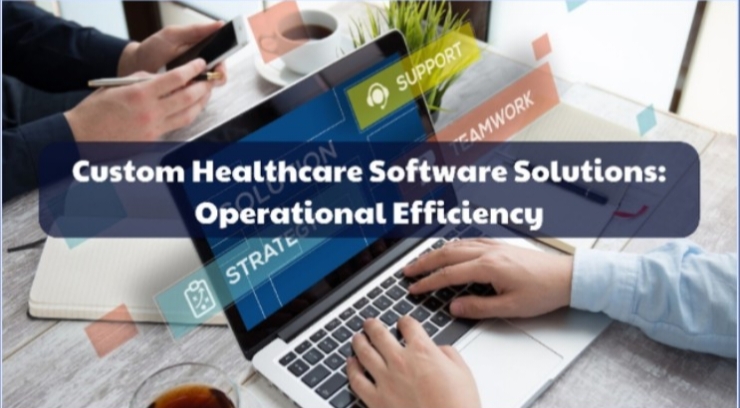Technology drives quality and operational efficiency in healthcare provision in today’s fast-changing world. At this point, tailored healthcare software solutions to the specific needs of healthcare care provision emerge to play an essential part in reaching these objectives. This article further discusses the role of custom healthcare software solutions in quality patient care and the selection of the right development partner.
What are Custom Healthcare Software Solutions and Why are they Important?
Custom healthcare software solutions are those applications built for particular needs within healthcare organizations. The solutions discussed here aim to manage unique workflows, integrate existing systems, improve care, and operate organizations efficiently.
You now know what Custom Healthcare Software Solutions are, so here are some reasons why they are essential.
- Addressing Special Needs and Workflows
Healthcare organizations often have specific workflows that generic software cannot easily accommodate. Custom software allows for tailored systems that match operational needs, improving efficiency.
- Glitch-free integration with existing systems.
Many healthcare providers already use legacy systems like EHRs and billing. Custom software can integrate smoothly with these, ensuring data continuity and minimizing disruption, which helps prevent data silos.
- Improving Patient Care and Engagement
Custom healthcare software enables personalized treatment, enhanced provider communication, and patient portals. This solution encourages active patient engagement and better health outcomes.
- Operational Efficiency Improvement
Custom solutions can automate billing, scheduling, and record management, reducing staff workload and enhancing workflow efficiency.

How Custom Software Improves Patient Care Quality
Custom healthcare software solutions are not just about smoothing processes; they can make a real and quantifiable difference in the quality of patient care. Health providers use technology to facilitate communication, make treatments more personalized, and give their patients better access to health information.
Smoothing Communication Among Health Professionals
Effective communication lies at the root of any high-quality health care. Custom healthcare software can offer an improved way for providers to communicate among themselves, secure messaging to share access to patient records, and real-time updates on patient status. Each care team member is fully informed of shared information, minimizing miscommunication and enhancing coordination.
For instance, based on the number of different specialists in the care of a patient, there is informed decision-making with custom collaboration and data-sharing platforms, hence better patient outcomes.
Facilitating Personalized Treatment Plans
The most significant benefit of custom healthcare software is its ability to support personalized treatment plans. By gaining access to detailed information about a patient, healthcare can adjust the treatments to suit particular needs. Decision support tools, automated risk assessments, and predictive analytics are among the key features of custom software that have facilitated more accurate and personalized care from the provider.
For instance, specialized software could track a patient’s progress over time, with feedback on how treatments work. This application can dynamically change and adapt a treatment plan for optimal patient care.
Patient Secure Access to Health Information
The issues of good health outcomes and patient engagement go hand in hand with each other. Custom healthcare software can provide secure access to patient health information through a patient portal. It empowers them to access information like medical records, test results, and treatment plans, engaging them in their healthcare.
Other security features in messaging enable the patient to communicate directly with the healthcare provider by asking questions and getting timely responses. This kind of access and communication improve the patient-provider relationship, thus improving satisfaction and, hopefully, treatment adherence.
Remotely Monitored and Telemedicine
The COVID-19 pandemic has advanced the wheel of telemedicine and remote patient monitoring, and the backbone of all these activities has something to do with customized healthcare software. With appropriate software, physicians can monitor patients from a distance, monitor their vital signs, and even receive real-time health updates. Such support mainly assists in ensuring that complications related to chronic diseases are limited.
The provided custom solution can be integrated with telemedicine capabilities, enabling providers to offer virtual consultations rather than in-person ones. Services like these allow health organizations to extend their care to patients, mainly those in remote or underserved areas.

Choosing the Right Custom Healthcare Software Development Partner
Here are some key things to remember when selecting a software partner for your custom software development for healthcare.
- Healthcare IT Skills
Healthcare is a specific setting requiring unique data security, compliance, and workflow management approaches- a perfect match for your healthcare IT development partner. They must understand the challenges in healthcare environments and provide solutions for them.
- Regulatory Requirements Understanding
Healthcare organizations must meet strict regulations, such as HIPAA, in the U.S. A qualified partner will be well-versed in these standards, ensuring the software is fully compliant. This framework includes implementing critical security features, like encryption and access controls, to protect patient data.
- Proven Track Record of Successful Implementations
Look at the history of the partner’s successful healthcare projects regarding case studies, client testimonials, or references that can deduce experience. A partner who has experience in the healthcare sector will be able to extend the best solution to your organization.
Tips for Implementing Custom Healthcare Software
Custom healthcare software implementation can be very complex. However, using best practices will ensure a smooth rollout and long-term success.
1. Involvement of End-Users during Development
During development, engage healthcare providers and staff to ensure the software meets day-to-day needs. Identify issues early and enhance usability with user interviews, focus groups, and beta testing.
2. Training and full support
Comprehensive training and ongoing support, including help desks and training materials, are essential for user comfort and resolving post-implementation issues.
3. Planning of Data Migration and System Integration
For organizations switching systems, ensure smooth data migration integrates with existing systems like EHRs for seamless data flow.
4. Defining Success with Clear Metrics
Establish metrics like operational efficiency, patient satisfaction, and care outcomes to assess and adjust the software’s impact.

Conclusion
It means better patient care, operational efficiency, and integration with other existing systems through custom healthcare software. These solutions will help improve care and lighten the administrative workload of the organizations. Such custom software helps organizations invest in better clinical outcomes, efficient workflow, and competitiveness in the digital world of healthcare.
Contact KMS Healthcare today if you want to learn more about how custom healthcare software solutions can positively impact your organization. Our expertise can guide you in designing and implementing the right solution. Begin the process now at KMS Healthcare. .
FAQs
Q: How long does it take to develop customized healthcare software?
Development timelines vary based on project complexity but usually range from a few months to over a year, depending on scope, features, and integration needs.
Q: Can custom software work with my current systems?
Yes, custom healthcare software can be designed to integrate with systems like EHRs and billing, ensuring seamless data flow, reducing manual entry, and minimizing errors.
Q: How will I make my solution compliant with regulatory requirements?
Partner with a healthcare IT expert who understands regulations like HIPAA. Security measures for protecting patient data include encryption and access controls; they will be implemented.

